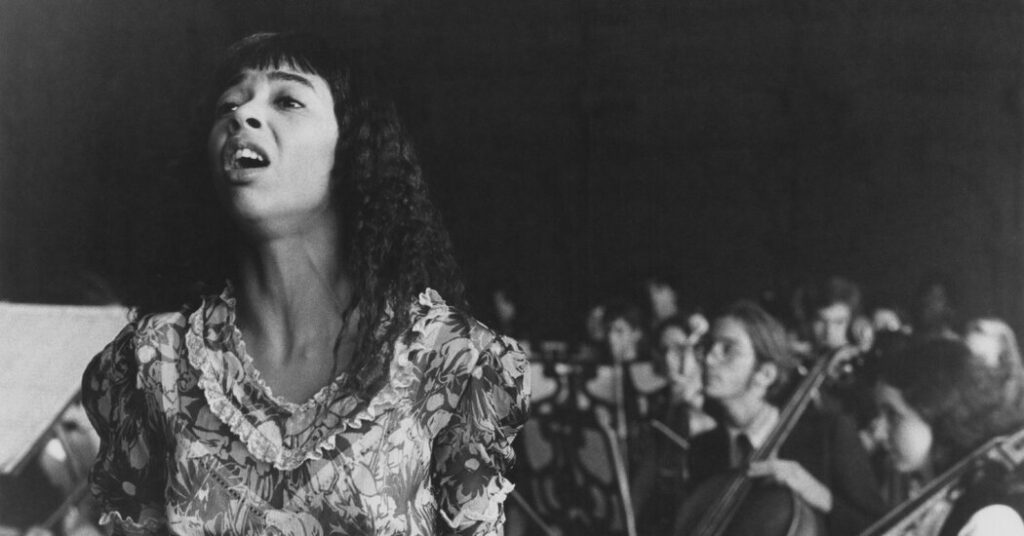
Irene Cara, who belted out the title tracks of two beloved song-and-dance movies of the 1980s, “Flashdance” and “Fame,” has died. She was 63.
Her death, at her Florida home, was confirmed by her publicist, Judith A. Moose, on Twitter on Saturday. Ms. Moose, who did not specify where in Florida or when Ms. Cara died, said the cause was “unknown and will be released when information is available.”
Ms. Cara, an actor, dancer and singer during her girlhood in the South Bronx, garnered expectations that she would become a major star. That never occurred, but she did become known for her contributions to two enduring movies, each of which chronicled the artistic ambitions of people like herself: talented, working-class city dwellers.
She scored her most memorable hit with “Flashdance … What a Feeling.” With a low, deep voice, she gently crooned the confessions that open the tune, then unleashed a power for sustaining notes in the exclamatory chorus.
In 1984, her writing credit on the song earned her Oscar and Golden Globe awards for best original song, and she also won a Grammy for best pop vocal performance.
In “Fame” (1980), Ms. Cara not only sang the title track but also appeared in a starring role as Coco Hernandez, one of several students the movie follows throughout their years at a New York City performing arts high school.
Ms. Cara knowledgeably incarnated a diva-to-be — chewing gum while pitching a fellow musician to start a band and instructing him “there’s a lot of money out there,” gleefully tap dancing in a puddle on a subway platform, twirling her sunglasses while singing at a piano, walking on a crowded sidewalk while looking absorbed in a showbiz industry newspaper.
In addition to singing the movie’s title number, “Fame,” Ms. Cara also sang another single on the soundtrack, the ballad “Out Here on My Own.” Both songs were nominated for an Oscar in 1981. The film was nominated for several awards, and “Fame” won for both best original song and score.
In 1980, a journalist with People magazine asked Ms. Cara to recount the achievements of her young career. “You’re obviously not from New York,” she replied. “Everyone in New York knows what I’ve done.”
Some commentators shared her lofty sense of herself. “Move over Streisand, Ross and Summer. Make room for Irene Cara,” Ebony magazine wrote in 1981. “Since co-starring in the Oscar-nominated movie ‘Fame,’ her career has taken off like lightning.”
Ms. Cara was born Irene Escalera on March 18, 1959, in the Bronx. She repeatedly disputed reports about her birth year, at times describing it as 1964. Her official Twitter account says she was born in 1962. Her mother told The New York Times in 1970 that a young Ms. Cara, already a busy performer by then, was 11 years old.
Her mother, Louise Escalera, was a cashier, and her father, Gaspar Escalera, was a saxophonist who worked at a steel factory. She told Ebony that she, her two brothers and two sisters belonged to a musical family, with a grandmother in Puerto Rico who could play five instruments.
Information on Ms. Cara’s survivors was not immediately available.
Ms. Cara grew up in New York City and attended music, acting and dance classes as a child; she was said to be able to play the piano by ear at age 5. She attended the Professional Children’s School in Manhattan, a school for child performers and children studying the arts.
At 13, she was a regular on “The Electric Company,” a children’s show broadcast mostly on public television in the 1970s. She was also a member of its band, the Short Circus.
Ms. Cara stayed busy, taking roles in theater, television and film, including the title role in “Sparkle,” a 1976 film about a family of female singers in the 1960s; it was remade in 2012.
She continued to act and make music into the 1990s, but she found herself bogged down by a lawsuit that she filed in 1985 against a record executive, Al Coury, and a firm of his, Network Records. She sued for $10 million, accusing Mr. Coury of exploiting her trust and withholding royalties from the “Flashdance” soundtrack and her first two solo records, “Anyone Can See” (1982) and “What a Feelin’” (1983).
In 1993, a California jury awarded her $1.5 million, People magazine reported in 2001.
She told People that the dispute had unjustly branded her as being difficult to work with and that she had been “virtually blacklisted” by the music industry. In 2020, she shared on YouTube two lighthearted dance songs from 1985 that she said had never been released because of the lawsuit.
By 2001, People was describing Ms. Cara as a singer whose time had come and gone, but whose stardom remained vivid to those who recalled it. During a recent recording session in Orlando, People reported, an agent had spotted a familiar face.
“Is that Irene Cara?” the agent whispered to a young client of his. “She was huge.”

